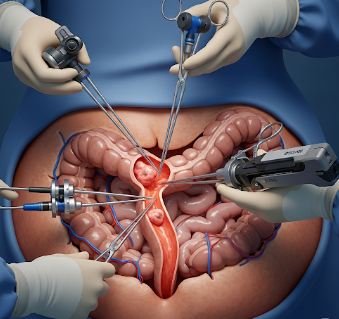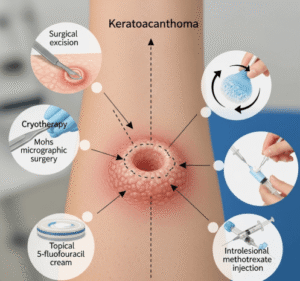Overview
Colon resection for colon cancer, also known as colectomy, is a surgical procedure performed to remove the cancerous portion of the colon along with nearby lymph nodes. The goal is to eliminate the tumor, prevent cancer spread, and restore bowel function.
In South Korea, colon cancer surgeries are performed using advanced minimally invasive laparoscopic techniques or traditional open surgery, offering high precision, reduced complications, and faster recovery. Korean hospitals are renowned for their expert colorectal surgeons, state-of-the-art operating facilities, and comprehensive post-operative care.
What is Colon Resection for Colon Cancer?
A colon resection involves the removal of the diseased segment of the colon along with adjacent lymph nodes to prevent cancer spread. The remaining healthy ends of the colon are then reconnected (anastomosis) to restore normal bowel continuity.
Types of colon resection include:
- Right hemicolectomy: Removal of the right portion of the colon.
- Left hemicolectomy: Removal of the left portion of the colon.
- Sigmoid colectomy: Removal of the sigmoid colon.
- Subtotal or total colectomy: Removal of a larger portion or the entire colon in select cases.
The choice of surgery depends on tumor location, stage, and overall patient health.
What are the Benefits?
Colon resection for colon cancer provides critical health and survival benefits:
✔ Complete removal of the tumor and affected lymph nodes.
✔ Prevention of local and distant cancer spread.
✔ Restoration of bowel continuity and function.
✔ Minimally invasive approaches reduce post-operative pain, scarring, and hospital stay.
✔ Early intervention improves overall survival and long-term outcomes.
Procedure Details
1) How should I prepare for Colon Resection for Colon Cancer?
- Medical evaluation: Blood tests, imaging (CT scan, colonoscopy), and cardiac/pulmonary assessments.
- Bowel preparation: Laxatives, enemas, or dietary modifications may be required.
- Medication review: Blood thinners and certain medications may need adjustment.
- Preoperative counseling: Discuss anesthesia, surgical technique, risks, and expected recovery.
- Arrange post-operative support: Assistance with mobility, diet, and wound care.
South Korean hospitals provide detailed preoperative planning and risk assessment, ensuring safe and successful surgery.
2) What happens during the procedure Colon Resection for Colon Cancer?
- Surgery is performed under general anesthesia.
- The surgeon removes the cancerous segment of the colon along with surrounding lymph nodes.
- Bowel continuity is restored via anastomosis using stapling or hand-sewn techniques.
- In laparoscopic surgery, small incisions and camera-guided instruments are used for precise dissection.
- Surgery duration typically ranges from 2–4 hours, depending on tumor size and complexity.
Korean surgeons focus on complete tumor removal, preservation of bowel function, and prevention of complications.
3) What happens after a Colon Resection for Colon Cancer?
- Patients are monitored in the hospital for 3–7 days depending on the procedure type and recovery.
- Pain is managed with medications, and early mobilization is encouraged.
- Dietary progression starts with liquids, advancing gradually to solid foods.
- Follow-up includes wound care, monitoring bowel function, and post-operative imaging.
- Full recovery and normal bowel function typically occur within 4–8 weeks.
South Korean hospitals provide structured post-operative follow-up and rehabilitation programs, including nutrition and activity guidance.
Risks / Benefits
Potential Risks:
- ➤ Infection at the incision site or intra-abdominally
- ➤ Bleeding
- ➤ Anastomotic leak (rare but serious)
- ➤ Bowel obstruction
- ➤ Complications from anesthesia
- ➤ Changes in bowel habits, diarrhea, or constipation
Major Benefits:
- ✔ Effective removal of colon cancer and affected lymph nodes
- ✔ Prevention of cancer recurrence or spread
- ✔ Restoration of bowel function and quality of life
- ✔ Minimally invasive surgery options reduce recovery time and complications
- ✔ High success rates in expert South Korean surgical centers
Recovery and Outlook
- Immediate post-op: Pain management, monitoring vital signs, and early mobilization.
- First week: Gradual resumption of light activity and careful monitoring of bowel movements.
- 2–6 weeks: Most patients can resume normal activities; recovery varies by individual health and surgery complexity.
- Long-term outlook: Successful surgery can improve survival, reduce recurrence risk, and restore quality of life.
South Korean hospitals provide long-term follow-up, including colonoscopy and imaging, to ensure optimal outcomes.
When To Call the Doctor
Contact your surgeon immediately if you notice:
- ➤ Severe abdominal pain or tenderness
- ➤ Fever, chills, or signs of infection
- ➤ Persistent vomiting or inability to pass stool or gas
- ➤ Unusual swelling, redness, or discharge at incision site
- ➤ Changes in bowel habits that do not improve
Best Korea Option / Process
South Korea is a leading destination for colon cancer surgery due to:
- Expert colorectal surgeons skilled in open and laparoscopic techniques
- State-of-the-art imaging and surgical facilities
- Minimally invasive surgery options for faster recovery and reduced scarring
- Comprehensive preoperative and post-operative care, including nutrition and rehabilitation
- International patient support, including translators, accommodation, and follow-up assistance
- Affordable treatment costs with world-class standards
Top hospitals for colon cancer surgery in Korea:
- Samsung Medical Center
- Asan Medical Center, Seoul
- Seoul National University Hospital
- Severance Hospital (Yonsei University Health System)













